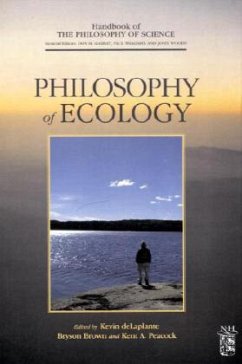The most pressing problems facing humanity today - over-population, energy shortages, climate change, soil erosion, species extinctions, the risk of epidemic disease, the threat of warfare that could destroy all the hard-won gains of civilization, and even the recent fibrillations of the stock market - are all ecological or have a large ecological component. in this volume philosophers turn their attention to understanding the science of ecology and its huge implications for the human project.
To get the application of ecology to policy or other practical concerns right, humanity needs a clear and disinterested philosophical understanding of ecology which can help identify the practical lessons of science. Conversely, the urgent practical demands humanity faces today cannot help but direct scientific and philosophical investigation toward the basis of those ecological challenges that threaten human survival. This book will help to fuel the timely renaissance of interest in philosophy of ecology that is now occurring in the philosophical profession.
Provides a bridge between philosophy and current scientific findings Covers theory and applications Encourages multi-disciplinary dialogue
To get the application of ecology to policy or other practical concerns right, humanity needs a clear and disinterested philosophical understanding of ecology which can help identify the practical lessons of science. Conversely, the urgent practical demands humanity faces today cannot help but direct scientific and philosophical investigation toward the basis of those ecological challenges that threaten human survival. This book will help to fuel the timely renaissance of interest in philosophy of ecology that is now occurring in the philosophical profession.
Provides a bridge between philosophy and current scientific findings Covers theory and applications Encourages multi-disciplinary dialogue
".whereas much prior philosophizing about ecology has been either environmental fluff or the academic rationalization of predetermined and platitudinous endpoints (e.g., wanton destruction of nature is unethical), there appears now to be the real possibility of a philosophy of ecology." (reprinted from The Quarterly Review of Biology, June 2012)--BookInspections.com, May 26, 2013
"The present volume brings together in one place the recent works of many thinkers, including those such as Jay Odenbaugh and Gregory Mikkelson, professional philosophers who have made understanding and interpreting ecology their primary focus (and not just ecology in general, but specific problems in ecological theory). Thus, whereas much prior philosophizing about ecology has been either environmental fluff or the academic rationalization of predetermined and platitudinous endpoints (e.g., wanton destruction of nature is unethical), there appears now to be the real possibility of a philosophy of ecology.. [T]the essays by Christopher Eliot (The Legend of Order and Chaos: Communities and Early Community Ecology), James Justus (A Case Study in Concept Determination: Ecological Diversity), and Sahotra Sarkar (Habitat Reconstruction: Moving Beyond Historical Fidelity) are landmarks in the clarification of the philosophical problems that are throughout ecology."--The Quarterly Review of Biology, June 2012, page 141-2
".whereas much prior philosophizing about ecology has been either environmental fluff or the academic rationalization of predetermined and platitudinous endpoints (e.g., wanton destruction of nature is unethical), there appears now to be the real possibility of a philosophy of ecology." (reprinted from The Quarterly Review of Biology, June 2012)--BookInspections.com, May 26, 2013
"The present volume brings together in one place the recent works of many thinkers, including those such as Jay Odenbaugh and Gregory Mikkelson, professional philosophers who have made understanding and interpreting ecology their primary focus (and not just ecology in general, but specific problems in ecological theory). Thus, whereas much prior philosophizing about ecology has been either environmental fluff or the academic rationalization of predetermined and platitudinous endpoints (e.g., wanton destruction of nature is unethical), there appears now to be the real possibility of a philosophy of ecology.. [T]the essays by Christopher Eliot (The Legend of Order and Chaos: Communities and Early Community Ecology), James Justus (A Case Study in Concept Determination: Ecological Diversity), and Sahotra Sarkar (Habitat Reconstruction: Moving Beyond Historical Fidelity) are landmarks in the clarification of the philosophical problems that are throughout ecology."--The Quarterly Review of Biology, June 2012, page 141-2
"The present volume brings together in one place the recent works of many thinkers, including those such as Jay Odenbaugh and Gregory Mikkelson, professional philosophers who have made understanding and interpreting ecology their primary focus (and not just ecology in general, but specific problems in ecological theory). Thus, whereas much prior philosophizing about ecology has been either environmental fluff or the academic rationalization of predetermined and platitudinous endpoints (e.g., wanton destruction of nature is unethical), there appears now to be the real possibility of a philosophy of ecology.. [T]the essays by Christopher Eliot (The Legend of Order and Chaos: Communities and Early Community Ecology), James Justus (A Case Study in Concept Determination: Ecological Diversity), and Sahotra Sarkar (Habitat Reconstruction: Moving Beyond Historical Fidelity) are landmarks in the clarification of the philosophical problems that are throughout ecology."--The Quarterly Review of Biology, June 2012, page 141-2

